The euro surged forward on Wednesday. It was set for its third consecutive day of gains after Russian Foreign Minister Sergei Lavrov announced that peace talks with Ukraine were not easy. However, there was hope for compromise. In a busy day for Forex markets, a stronger common currency and Chinese yuan overshadowed the dollar index. The latter plummeted down ahead of a Federal Reserve policy statement. Markets expect the central bank to hike interest rates for the first time in the last three years.
On Wednesday, the euro jumped by 0.4% to $1.10005. The currency began rising after Lavrov declared that some deals with Ukraine were close to being agreed upon. According to him, the neutral status for Kyiv is under serious consideration. Meanwhile, Ukrainian President Volodymyr Zelensky stated that the talks sounded more realistic, adding that more time was needed.
Neil Jones, the head of FX Sales at Mizuho Bank, noted that the euro and other European currencies, including the Norwegian and Swedish crowns, found some support from the developments in the talks. The super rallies in Asia stock markets running into a more optimistic tone on European geopolitics also buoyed FX risk sentiment.
On Wednesday, the Swedish crown was set for its best week against the euro since May 2020. It soared by 1% to a five-week high of 10.4275. Riksbank Governor Stefan Ingves stated that a rate hike may come sooner than 2024, as initially planned, amid soaring inflation. The commodity-linked Norwegian crown also jumped by 1.3% versus the greenback to 8.9040. On the other hand, the Australian dollar gained 0.8% to $0.72495.
How is the British Pound trading?
Sterling surged by 0.4% to $1.3091, climbing from Tuesday’s 16-month low of $1.3000. Forex markets expect the Bank of England to increase rates by another quarter-point on Thursday.
The dollar index tumbled down by 0.33% to 98.604 against six major currencies on Wednesday. The euro is the most heavily weighted among them right now. The greenback exchanged hands at 118.315 Japanese yen. It was little changed from Tuesday when it hit 118.450 yen for the first time since January 2017.
Money markets are betting that the Fed will hike interest rates later in the day. Traders also expect the Bank of Japan to leave ultra-loose policy settings in place. It plans to review its policy on Friday.
The U.S. dollar declined by 0.3% to 6.3712 Chinese yuan in the offshore market. According to China’s Xinhua news agency, Vice Premier Liu He announced that the country would roll out policy steps favorable for its capital markets.
Meanwhile, most EM stocks rallied on Wednesday, boosted by China’s pledge to roll out stimulus measures. Investors’ hopes about progress in Russia-Ukraine peace talks also bolstered the markets. However, jitters around the U.S. Federal Reserve’s rate verdict and inflationary pressures lingered.
MSCI’s Emerging Market currencies index gained 0.3% today. The Polish zloty and the Czech crown soared by 0.1% and 0.7% against the euro, respectively. Piotr Matys, the senior FX analyst at In Touch Capital Markets, noted that market sentiment improved after China pledged to boost financial markets and its economy. Traders also heard Lavrov saying there’s hope for agreement in Ukraine talks. So, there is definitely optimism today and hopes that a ceasefire will be announced.
How is the Russian ruble faring?
The ruble climbed higher in Moscow trade due to hopes of peace talks. Markets focused on whether Russia would manage to pay coupons on sovereign debt, which is due later in the day. Piotr Matys thinks economic activity will likely lose momentum across EMs due to high inflation. It seems to last for a longer period than expected before the war began.
The MSCI EM stocks benchmark has declined by 12% this month. It lost 15% since the onset of the war, driven by risk aversion tied to concerns surrounding global stagflation, as well as a tighter monetary policy environment in the developed world and the fallout from Russia’s invasion of Ukraine in late February.
Investor focus is on the U.S. Fed, hoping the agency can guide future tightening and potentially close the door on its ultra-easy pandemic-era monetary policy. Meanwhile, the Turkish lira plummeted by 0.2% against the dollar. The South African rand edged up by 0.2% on Wednesday, though.











